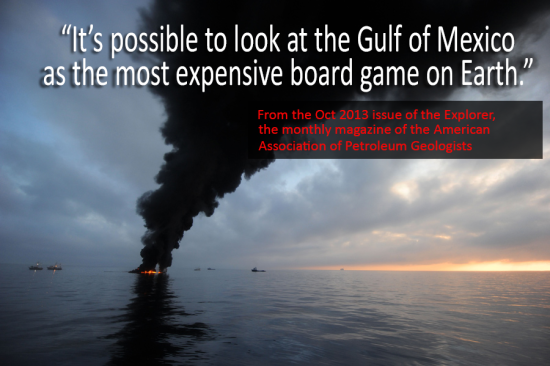There was a scene in the 1980s film, Crocodile Dundee, where a group of punks pull switchblades on the Aussie hero and demands his wallet. Dundee looks amused. His girlfriend urges him to hand over his cash, pointing out that the thief has a knife.
“That’s not a knife,” laughs Dundee. He whips out a humongous Bowie knife with a 10-inch blade. “Now, this,” he says with a smirk, “is a knife.”
I thought of that line today after happening on an article titled, “Players Focus on Deepwater Alaminos Canyon.” The piece appeared in the October 2013 issue of Explorer, a monthly publication of the American Association of Petroleum Geologists. One of the benefits of the Internet is the easy access it provides to places from which we were previously barred. As a virtual fly on the wall, you can hear what people or groups say when they alone, just talking among friends.
The Explorer article has a lede that gave me vertigo: “It’s possible to look at the Gulf of Mexico as the most expensive board game on Earth.”
Keep in mind that this was written three years after the BP Deepwater Horizon disaster that killed 11 people and allowed nearly 5 million barrels of oil to flow unchecked into the Gulf for some 87 days. That disaster — the worst of its kind to this point — isn’t mentioned in the article. The analogue to a board game refers to a battle between oil companies to exploit the black gold beneath the Gulf even more intensively, and to do it deeper. The wellhead under the Deepwater Horizon was 5,000 feet below the surface. The difficulty operating equipment at that depth played a large role in the scale of the BP disaster. It was just too deep to cap after the explosion.
And here’s what reminded me of the scene from Crocodile Dundee. The “Deepwater Horizon?” That wasn’t deep water. The article trumpets “the world’s deepest drilling and production platform, floating in more than 8,000 feet of water.” Three thousand feet deeper than the Deepwater Horizon’s well.
Now, that is deep water.
Seriously, have we learned anything from the 2010 disaster?
Apparently, someone has: the article ends with this sobering quote from John Snedden, identified as the director of the Institute for Geophysics at the Jackson School of Geosciences, University of Texas at Austin.
“One thing I learned after 25 years in the industry,” he said. “Never underestimate the power of technology and the persistence of engineers and geologists to develop large discovered volumes of oil and gas.”
I don’t doubt that for a second.
